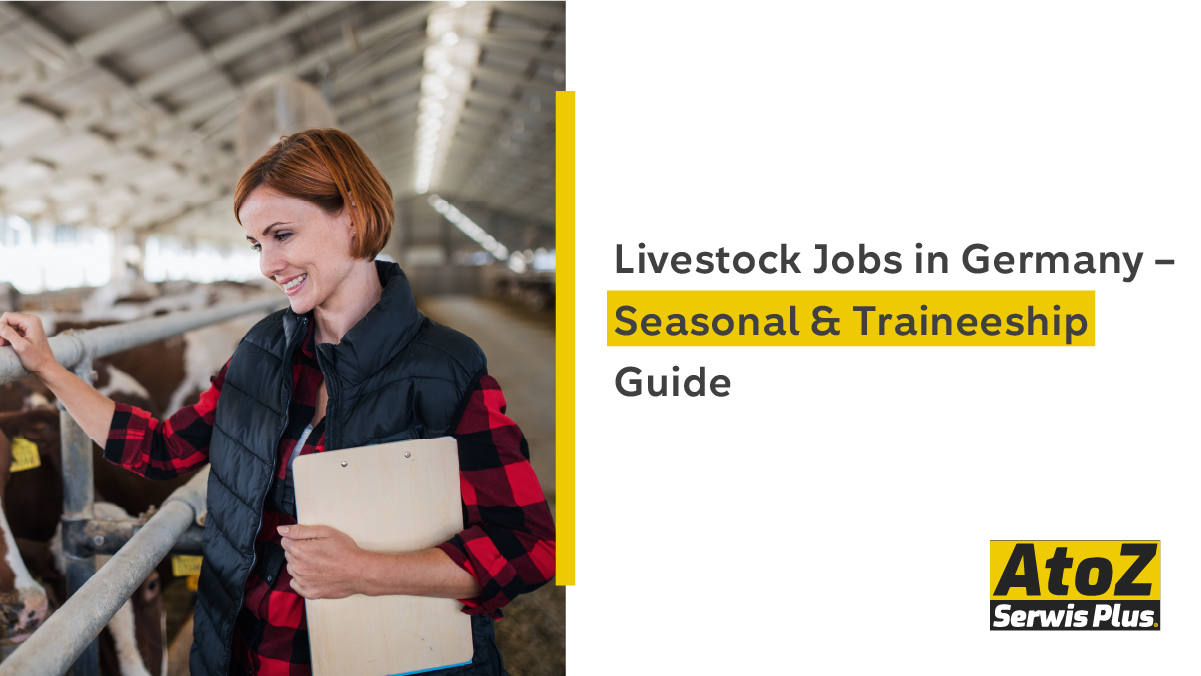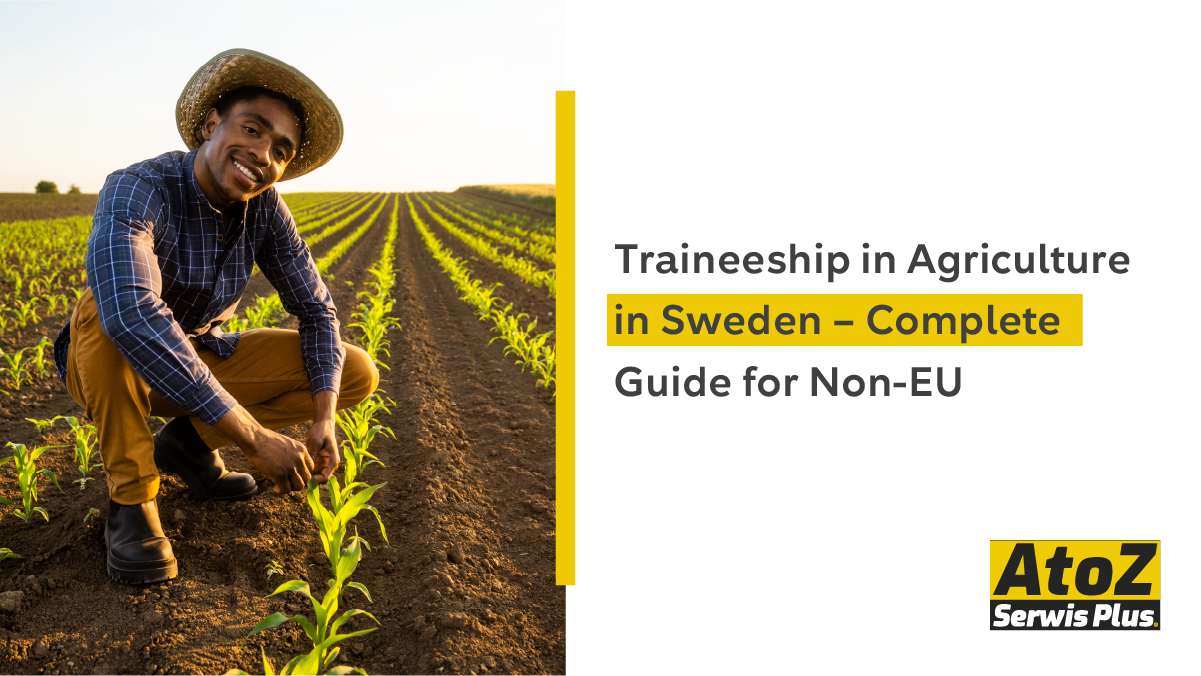

Livestock Jobs in Germany – Seasonal & Traineeship Guide
Are you searching for livestock jobs in Denmark with a legal work visa? Denmark offers a unique opportunity for graduates in agriculture, animal life sciences, and animal husbandry through its paid traineeship program. This pathway allows international candidates to gain hands-on experience in Denmark’s modern farming sector, earn a competitive salary, and live in one of Europe’s most advanced agricultural economies.
In this guide, you’ll find everything about the Denmark traineeship visa, eligibility, salary, benefits, documents required, and step-by-step application process.
Why Work in Denmark’s Livestock Industry?
Denmark is one of Europe’s leaders in dairy and livestock farming, known for its advanced technology, high-quality production, and strong labour standards. International trainees benefit from:
- Competitive salaries and secure contracts
- Safe and regulated working environment
- Professional training in modern livestock methods
- Accommodation provided near the workplace
- Legal visa support for the whole traineeship period
Denmark Livestock Traineeship – Key Details
- Duration: Up to 12 months
- Working Hours: 40 hours per week + occasional paid overtime
- Salary: €12.82 per hour before tax
- Accommodation: Shared housing near the workplace, approx. €300/month including utilities
- Visa Type: Long-term national visa (traineeship)
- Visa Processing Time: About 3.5 months
- Visa Fee: €90
With accommodation arranged and a guaranteed legal employment, trainees can focus on building skills and gaining international experience.
Eligibility Requirements
To qualify for the livestock traineeship in Denmark, candidates must meet the following conditions:
- Hold a Diploma or Degree in Agriculture, Animal Life Science, or Animal Husbandry.
- Veterinary graduates are not eligible, as they are considered overqualified for this position.
- The university must be listed as H+ on the Anabin database: Check here.
- Graduation within the last 5 years.
- Age between 21 and 35 years.
- English level: B1 or higher, confirmed by an interview.
- Financial readiness to cover travel and personal costs.
- Driving license: Optional, but considered an advantage.
- Strong work ethic and professional attitude.
Documents Required
When applying for the Denmark traineeship visa, you must prepare:
- CV in Bixter format (with a professional smiling photo)
- Diploma or degree certificate
- Transcript of records
- Valid passport copy
Step-by-Step Application Process
- Secure a traineeship offer in Denmark’s livestock industry.
- Prepare documents, including degree, transcript, CV, and passport.
- Apply for a long-term traineeship visa at a Danish embassy/consulate or online.
- Pay visa fee (€90).
- Please wait for processing, which typically takes around 3.5 months.
- Receive approval and collect your visa.
- Travel to Denmark and begin your traineeship.
Salary and Benefits
- Hourly Pay: €12.82 before tax
- Monthly Earnings: Approx. €2,000 before tax (based on 40 hours/week)
- Housing: Shared accommodation, €300/month (including utilities)
- Overtime: Paid additionally
- Visa Support: Long-term national visa included
Career Growth After the Program
The Denmark traineeship is temporary, but it gives candidates valuable European work experience that can:
- Strengthen your CV for future EU jobs
- Help you qualify for skilled worker visas in Europe
- Open doors to further opportunities in agriculture and farming
Final Thoughts
If you’re a graduate in agriculture, animal husbandry, or life sciences and seeking international experience, Denmark’s livestock traineeship program is an excellent option. With secure contracts, fair wages, and legal visa support, it is one of the best entry points into the European farming industry.
Start your application today with AtoZ Serwis Plus – we provide complete guidance, from preparing documents to securing your visa and employer placement.
Learn more here: Paid Internship in Denmark – Full Guide.
FAQs – Livestock Jobs in Denmark
Seasonal Work in Germany – Visa & Permit Guide for Non-EU Citizens
Germany is one of the most popular destinations in Europe for seasonal workers. Each year, thousands of non-EU citizens are employed in industries such as agriculture, hospitality, and logistics during peak demand periods. For those who want to work in Germany legally and temporarily, a seasonal work permit is required.
In this guide, we address the most frequently asked questions about the German seasonal work visa, including eligibility, duration, applicable sectors, requirements, and the application process.
Is there a seasonal work visa for non-EU citizens in Germany?
Yes. Non-EU citizens can apply for a Seasonal Work Visa to take up short-term jobs in Germany. This visa is issued when there is a demand for additional labour that German or EU workers cannot fill. It is typically linked to a specific employer and role.
How long can I work in Germany on a seasonal permit?
Seasonal work permits in Germany are generally valid for up to 90 days within 180 days. In some cases, depending on agreements between the German Federal Employment Agency and your home country, this may be extended up to six months.
Which sectors hire seasonal workers in Germany?
Seasonal workers are mainly employed in industries that experience peak demand during specific times of the year, including:
- Agriculture & Horticulture – fruit and vegetable harvesting, asparagus, strawberries, vineyards, flower farms
- Hospitality & Tourism – hotels, holiday resorts, restaurants during summer and winter seasons
- Food Processing & Packaging – temporary roles in factories and logistics centres during seasonal peaks
Is a visa always required for seasonal work in Germany?
Yes, if you are a non-EU/EEA or Swiss citizen, you need a visa and work permit. EU/EEA and Swiss nationals can work freely in Germany without a permit.
Can I apply for residence in Germany through seasonal work?
No. Seasonal work in Germany is temporary only and does not lead to long-term residence or permanent settlement. Once your contract ends, you are expected to leave Germany.
Is there an employer sponsorship requirement in Germany?
Yes. Seasonal work permits are always tied to a specific employer. Employers must apply to the German Federal Employment Agency (Bundesagentur für Arbeit) to confirm labour shortages before hiring non-EU workers.
Do I need health insurance in Germany as a seasonal worker?
Yes. Health insurance is mandatory for all seasonal workers. Employers often arrange it, but you must confirm coverage before starting work. Without valid health insurance, your visa may not be approved.
Is the German language required for seasonal work in Germany?
Not always. Many seasonal jobs in agriculture, hospitality, or food processing can be done without speaking German. However, basic German skills are highly recommended to communicate with supervisors, co-workers, or in daily life.
Can I switch employers in Germany during the seasonal work period?
No. Your seasonal work visa is tied to the employer who sponsored you. If you wish to change employers, a new application must be submitted to the Federal Employment Agency.
Can I extend beyond 90 days in Germany?
Yes, but only under certain conditions. Seasonal permits can be extended up to six months if there is ongoing demand and approval from the German Federal Employment Agency. However, extensions beyond this are not allowed.
Can I bring my family to Germany on a seasonal permit?
No. Seasonal work visas do not allow family reunification. This visa category is strictly temporary and only for the worker.
Where do I apply for a German seasonal work permit?
You must apply at the German embassy or consulate in your country of residence. The employer in Germany must first obtain approval from the Federal Employment Agency (Bundesagentur für Arbeit).
Official source: Federal Employment Agency – Seasonal Workers
Application Process – Step by Step
- Secure a Job Offer – Find a seasonal employer in agriculture, hospitality, or food production.
- Employer Approval – The Employer applies to the Federal Employment Agency to confirm that a non-EU worker can fill the position.
- Visa Application – Submit your application to the German embassy/consulate in your country with your job contract and supporting documents.
- Health Insurance & Documents – Provide proof of health insurance, a valid passport, photos, and accommodation details.
- Visa Decision – Processing usually takes 4–8 weeks.
- Travel to Germany – Start work under the terms of your visa.
Benefits of Seasonal Work in Germany
- Competitive salaries compared to other EU countries
- Employers often provide accommodation and meals
- Legal and regulated contracts
- International work experience in Europe
Final Thoughts
Germany offers excellent opportunities for seasonal workers in agriculture, hospitality, and food production. With the right employer sponsorship, required documents, and health insurance, non-EU citizens can legally work in Germany for up to 90 days or even six months. While this visa does not lead to permanent residence, it provides valuable experience and a safe, structured pathway to work in Europe.
If you are ready to apply for a German Seasonal Work Visa, AtoZ Serwis Plus can guide you through the entire process – from securing an employer to handling your visa paperwork.













